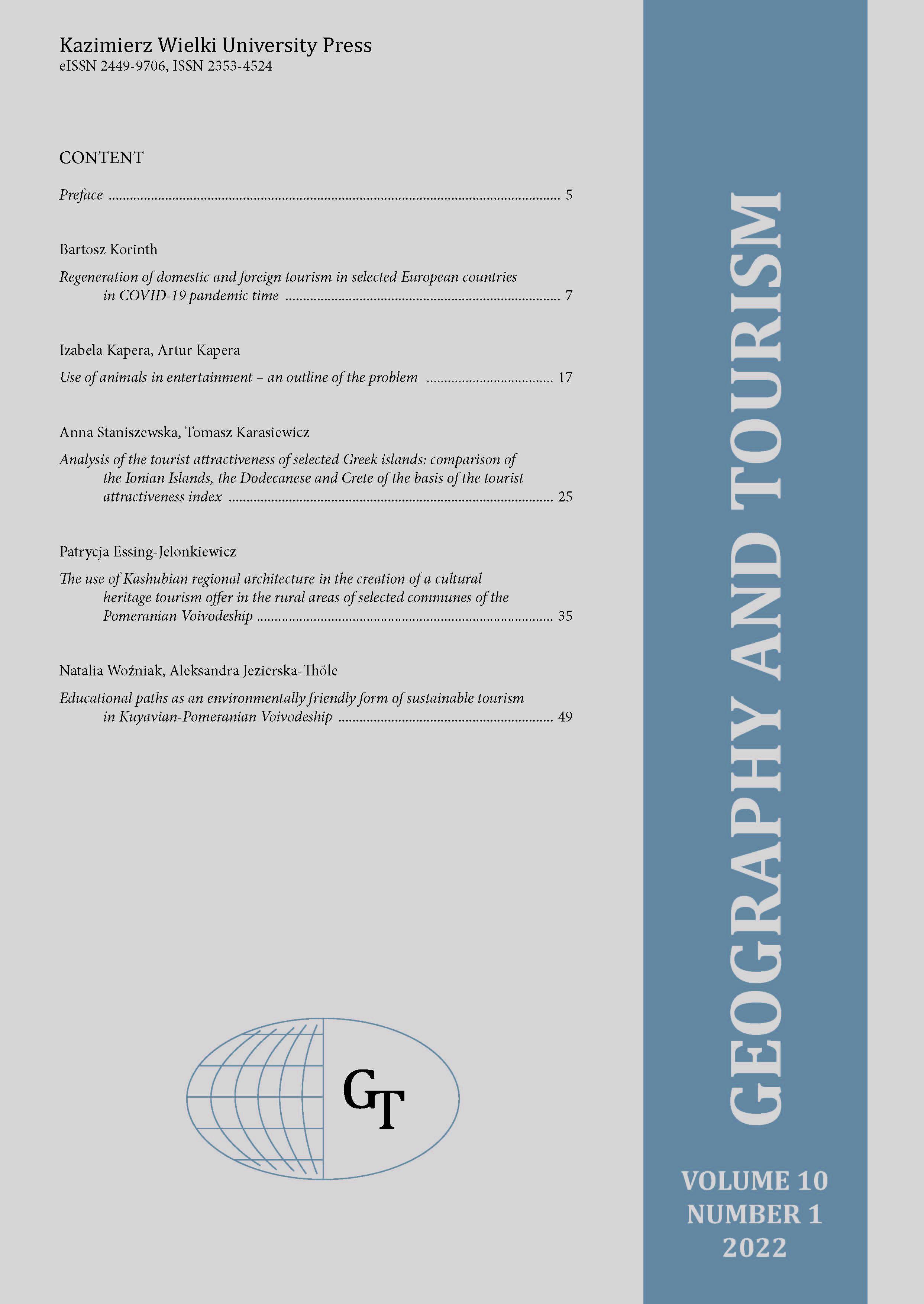Regeneration of domestic and foreign tourism in selected European countries in COVID-19 pandemic time
DOI:
https://doi.org/10.34767/GAT.2022.10.01Keywords:
pandemic, COVID-19, domestic tourism, foreign tourism, accommodation, EUAbstract
The COVID-19 pandemic and the measures taken to subdue it have led to the collapse of both domestic and foreign tourism. The article attempts to provide answers to the following questions: what was the occupancy rate of tourist accommodation facilities by domestic and foreign tourists in the European Union and in selected European countries? Does domestic toursim regenerate faster than foreign tourism? Which country has the greatest disproportions in the regeneration of domestic and foreign tourism? In order to answer the questions, it was decided to use the Excel program together with the R software, in which the analysis of the time series of the occupancy of tourist accommodation facilities throughout the European Union was performed. Based on the results of the research, it was found that, although in the initial phase of the pandemic, the decline in the occupancy of accommodation facilities was similar for both domestic and foreign tourists, in the following months the role of the former in the occupancy of accommodation facilities increased significantly. These differences were visible in all analyzed countries, which confirms the thesis that domestic tourism regenerates faster than foreign tourism. The largest disproportions among selected countries in the regeneration of domestic and foreign tourism were noticed in Malta.
References
Bakar N. A., Rosbi S., 2020. Effect of Coronavirus disease (COVID-19) to tourism industry. International Journal of Advanced Engineering Research and Science 7(4), 189-193. https://dx.doi.org/10.22161/ijaers.74.23
Barua S., 2020. Understanding Coronanomics: The economic implications of the coronavirus (COVID-19) pandemic”. SSRN Electronic Journal, 1-45, https://dx.doi.org/10.2139/ssrn.3566477
Falk M., Hagsten E., Lin, X., 2022. High regional economic activity repels domestic tourism during summer of pandemic. Current Issues in Tourism 25(8), 1209-1225 https://doi.org/10.1080/13683500.2021.1968805
Feyisa H. L., 2020. The World Economy at COVID-19 quarantine: contemporary review. International Journal of Economics, Finance and Management Sciences 8(2), 63-74
Guan D., Wang D., Hallegatte S., Huo J., Li S., Bai Y., Cheng, D., 2020. Global economic footprint of the COVID-19 pandemic. Research Square, https://doi.org/10.21203/rs.3.rs-25857/v1
Gössling S., Scott D., Hall C. M., 2021. Pandemics, tourism and global change: a rapid assessment of COVID-19. Journal of Sustainable Tourism 29(1), 1-20 https://doi.org/10.1080/09669582.2020.1758708
Hafsa S., 2020. Impacts of COVID-19 Pandemic on Tourism & Hospitality Industry in Bangladesh. SSRN Electronic Journal, https://dx.doi.org/10.2139/ssrn.3659196
Haryanto T., 2020. COVID-19 pandemic and international tourism demand. Journal of Developing Economies 5(1), 1-5 http://dx.doi.org/10.20473/jde.v5i1.19767
Khan A., Bibi S., Lorenzo A., Lyu J., Babar Z. U., 2020. Tourism and development in developing economies: A policy Implication perspective. Sustainability 12(4), 1618. https://doi.org/10.3390/su12041618
Korinth B., Ranasingh E. R., 2020. COVID-19 pandemic's impact on tourism in Poland in march 2020. GeoJournal of Tourism & Geosites 31(3), 987-990. https://doi.org/10.30892/gtg.31308-531
Korinth B., Wendt J. A., 2021. The impact of COVID-19 pandemic on foreign tourism in European countries. Prace Komisji Geografii Przemysłu Polskiego Towarzystwa Geograficznego 35(3). https://doi.org/10.24917/20801653.353.11
Kourgiantakis, M., Apostolakis, A., & Dimou, I., 2021. COVID-19 and holiday intentions: The case of Crete, Greece. Anatolia, 32(1), 148-151. https://doi.org/10.1080/13032917.2020.1781221
Kumar A., 2020. Disastrous impact of Coronavirus (COVID 19) on Tourism and Hospitality Industry in India. Journal of Xi'an University of Architecture & Technology XII(V), 698-712.
Laing T., 2020. The economic impact of the Coronavirus 2019 (Covid-2019): Implications for the mining industry. The Extractive Industries and Society 7(2), 580–582 https://doi.org/10.1016/j.exis.2020.04.003
Li S., Blake A., Cooper C., 2010. China's tourism in a global financial crisis: a computable general equilibrium approach. Current Issues in Tourism 13(5), 435-453 https://doi.org/10.1080/13683500.2010.491899
Matsuura T., Saito H., 2022. The COVID-19 pandemic and domestic travel subsidies. Annals of Tourism Research 92, 103326 https://doi.org/10.1016/j.annals.2021.103326
Melnychenko S, Tkachenko T., Dupliak T., 2021. Digitalisation as a tool of tourism recovery in European Union in post-COVID-19. FINANCIAL AND CREDIT ACTIVITIES: PROBLEMS OF THEORY AND PRACTICE 6(41), 427-436 https://doi.org/10.18371/fcaptp.v6i41.251471
Ozili P., Arun, T., 2020. Spillover of COVID-19: Impact on the Global Economy. SSRN Electronic Journal. https://dx.doi.org/10.2139/ssrn.3562570
Panasiuk A. 2020. Przyczynek do badań nad wpływem pandemii na stan gospodarki turystycznej. [In:]Turystyka w Naukach Społecznych, Tom 3,. Ekonomia i Finanse, [Ed.:] K. Nessel. Wydawnictwo Uniwersytetu Jagielońskiego, Kraków, Polska, 55-70 [In polish].
Rogerson C. M., Rogerson J. M., 2020. COVID-19 Tourism impacts in South Africa: Government and industry responses. GeoJournal of Tourism and Geosites 31(3), 1083-1091 https://doi.org/10.30892/gtg.31321-544
Rutynskyi M., Kushniruk H., 2020. The impact of quarantine due to COVID-19 pandemic on the tourism industry in Lviv (Ukraine). Problems and Perspectives in Management 18(2), 194 http://dx.doi.org/10.21511/ppm.18(2).2020.17
Sharpley R., 2000. The influence of the accommodation sector on tourism development: lessons from Cyprus. International Journal of Hospitality Management 19(3), 275-293 https://doi.org/10.1016/S0278-4319(00)00021-9
Susilawati S., Falefi R., Purwoko A., 2020. Impact of COVID-19’s Pandemic on the Economy of Indonesia. Humanities and Social Sciences 3(2), 1147-1156. https://doi.org/10.33258/birci.v3i2.954
Wendt J. A., 2019. Comparison of the impact of the Arab Spring and terrorist attacks on the decline in tourism in Egypt and Tunisia (2010-2015). GeoJournal of Tourism and Geosites 27 (4), 1367–1376. https://doi.org/10.30892/gtg.27421-440
Volgger M., Taplin R., Aebli, A., 2021. Recovery of domestic tourism during the COVID-19 pandemic: An experimental comparison of interventions. Journal of Hospitality and Tourism Management 48, 428-440 https://doi.org/10.1016%2Fj.jhtm.2021.07.015
Eurostat. 2020. Nights spent at tourist accommodation establishments - monthly data. https://ec.europa.eu/eurostat/databrowser/product/page/TOUR_OCC_NIM (Date of access: 01.04.2022).
UNWTO. 2020a. Impact assessment of the COVID-19 outbreak on international tourism. https://www.unwto.org/impact-assessment-of-the-covid-19-outbreak-on-international-tourism (Date of access: 10.05.2022).
UNWTO. 2020b. UNWTO World Tourism Barometer (Vol. 18, Issue 7, December 2020). https://doi.org/10.18111/wtobarometereng (Date of access: 00.00.2022).
UNWTO 2020c. COVID-19 Related Travel Restrictions: A Global Review for Tourism. Second Report as of 28 April 2020. Retrieved from https://webunwto.s3.eu-west1.amazonaws.com/s3fspublic/2020-04/TravelRestrictions - 28 April.pdf (Date of access: 01.04.2022).
World Travel & Tourism. 2017. World Travel Tourism Economic Impact Report, https://destinationsinternational.org/industry-reports/world-travel-tourism-economic-impact-report (Date of access: 01.05.2022).
Downloads
Published
Issue
Section
License

This work is licensed under a Creative Commons Attribution-NonCommercial-NoDerivatives 4.0 International License.

